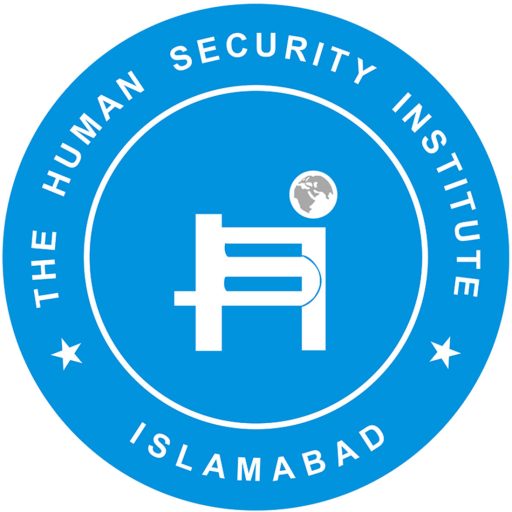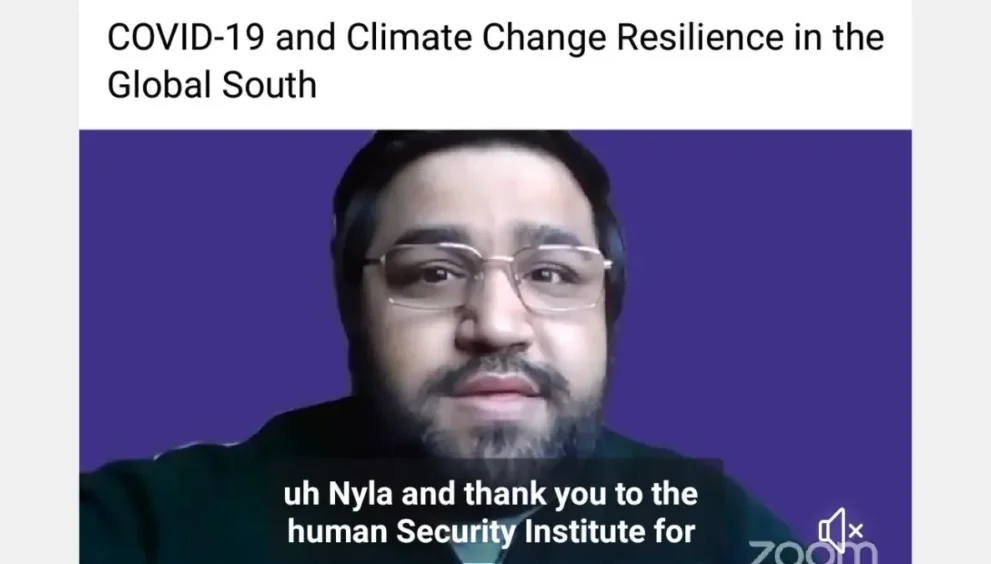The Human Security Institute
Minutes of the 13th lecture of Lecture Series on “Exploring the Dimensions of Human Security”.
Topic of the Lecture: COVID-19 and climate change resilience in Pakistan
Guest Speaker: Mohsen Gul
Date: July 8, 2021
Time: 01:00 pm
COVID-19 has emerged as a challenge to humanity and mankind is doing its best to cope with this emerging existential threat of infectious diseases and zoonotic diseases. A review of global trends suggests that there is a rise in the spread of infectious diseases since 1940. About 60 per cent of these diseases are zoonotic and slightly over 70 per cent of the zoonotic infections are caused by pathogens that originate in wildlife. Some of the reasons why the frequency of the diseases is increasing is because of the increased close contacts between wildlife and humans, encroachments of lands, urbanization and socio-economic development. The increase in human population has put a lot of stress on the environment, Land use, climate change, economic development, population growth and people living in densely populated areas are all contributors for zoonotic emergence, making it easy for diseases to spill over from animals to humans. Human impact has caused the diseases like COVID-19 to spread. Environmental security is one of the primary components of human security that determines the wellbeing of a people. Environmental degradation is a non-traditional security threat, and it has got a lot of attention in recent years. Sadly, environment is decline in Pakistan, and indicators are not showing a positive image for Pakistan. Pakistan has paid a heavy cost for environmental degradation as in 2016, it was estimated at around 25.1 billion USD. There has been a rapid population growth, rapid industrialization, urbanization, and a poor management of natural resources that have contributed to the environmental problem of Pakistan. Moreover, a reduction in glaciers in the Hindukush-Himalaya region and water and heat stress is causing more distress to the environment in Pakistan.
On average, one infectious disease emerges in human every four months and 75% of these infections emanate from animals. The spill over of such diseases occur when humans destroy the natural habitats of wildlife or human contacts is increased with such animals in the forms of illegal trafficking of wild animals. The COVID-19 pandemic has shown us that if we want our ecosystems to take care of us, we need to take care of the ecosystem better. The degradation of the environment and climate change reduce the natural ability of ecosystem for disease control, that result in a spill over effect. This creates an increased chance of zoonotic spill overs. When people degrade wildlife habitats or establish their own settlements in some areas, then they become part of the ecosystem. They become part the sylvatic cycle–the cycle of virus transmission that happens between animals in forests. Pakistan is facing increased monsoon variability, melting glaciers, and rising temperature that is more than the expected global average for the future, Siltation in dams and an over all climate change is creating the risks of more floods and droughts.
The interaction of humans or livestock with wildlife exposes them to the risk of spill over of potential pathogens. The drivers of zoonotic disease emergence are changes in the environment—usually the result of human activities. Human-induced environmental changes modify wildlife population structure and reduce biodiversity, resulting in new environmental conditions that favour hosts, vectors, and/or pathogens. It is impossible to predict where the next epidemic will occur. Growing evidence suggest that we will see a rise in the outbreaks of infectious diseases in the future. There has been a great link found between climate change and infectious diseases. Climate change is driven by the rising mean global temperatures. Climate change is also responsible for deaths other than infectious diseases. There has been a steady rise in climate change related deaths in recent years infectious diseases like malaria and other vector-based diseases are directly linked to the rising temperatures. And Pakistan is a country with a very low universal health coverage and Pakistan is also at a very high risk of climate change.
We need to use mitigation and adoption methods to reduce the impacts of climate change to protect the environment and decrease the probability of another infectious outbreak. climate change mitigation will have a direct impact on the spread of infectious diseases. A focus on better health system is also of a pertinent importance, also, spreading awareness and educating people about the impact of infectious diseases and climate change is essential to fight back this twofold problem.
Zoonotic diseases are on the rise, and it is directly impacted by the land degradation and climate change. Climate change has disproportionate impacts on the human health all over the world, and the responsibility befalls on the entire scientific community to help contain and mitigate these phenomena of Climate Changes, which has caused damage to the humanity in the form of COVID-19 pandemic.
Short BIO of speaker
Mr Mohsen is a senior climate change youth specialist at Asian Development Bank and PhD scholar at University of Nottingham and University of Oxford. He has over 10 years of diverse experience in the international development and governance sectors. He also supports British Council as the Sector Specialist for youth climate action at COP26 and as lead author for youth perceptions of climate change in South Asia. Besides this, Mr. Mohsen was selected as UN Young Champion of the Earth (Asia and the Pacific) regional finalist 2019 and won Emerging Star for Policy Impact award 2019 at the University of Nottingham. His doctoral research work at the Universities of Nottingham and Oxford focused on critically analyzing how youth volunteering can be mainstreamed in multi-level environmental governance processes in Pakistan. He has co-founded ‘Green Box’, Pakistan’s first youth-driven engagement lab nurturing sustainability leadership in Pakistan.



